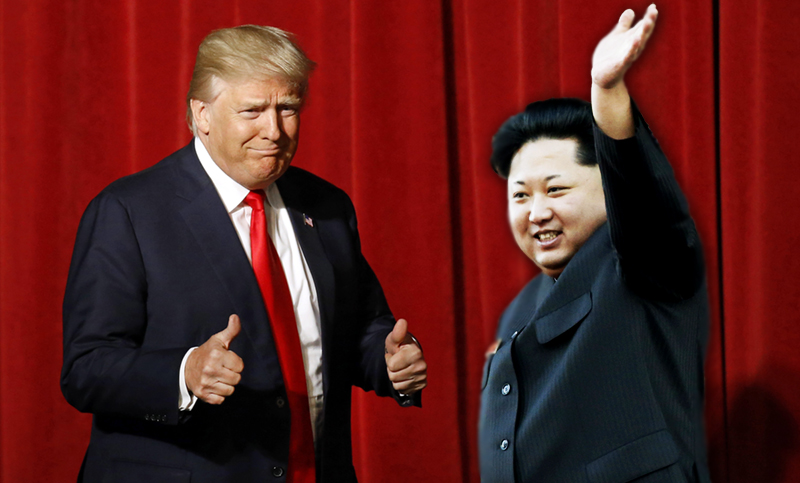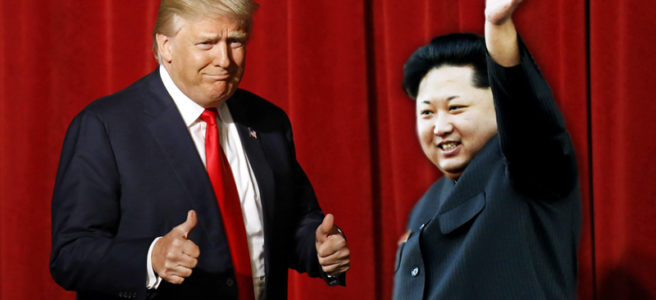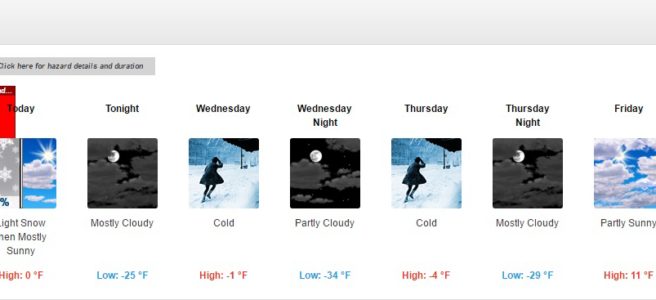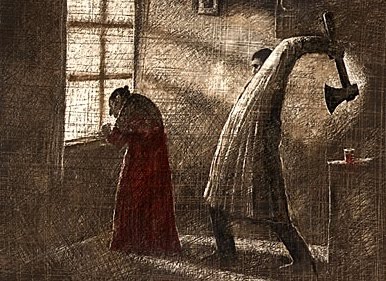Welp, here it goes. The world is waiting on pins and needles to see what exactly is going to happen over the coming days and weeks as Donald Trump is inaugurated and his administration begins to take shape. This week represents a dramatic shift in US and World politics, unlike anything we’ve seen since, say, the 16th century. Although to catch a glimpse of what an unchecked Trump Presidency might look like, there is one other modern country that embraces his leadership style.
There is one country that always seems to overplay its hand. One country that has thrown caution to the wind and completely adopted a bull-in-the-china-shop approach to diplomacy. One country that is consistently viewed from afar as irrational, insane, and stupid, but keeps on keeping on day after day. There is one country that is continually dismissed and underestimated, but which has bluffed its way to a seat at the adults table. One country which, in the face of more or less global opposition, has staged three nuclear weapons tests in the last decade.
Donald Trump’s campaign has much more in common with North Korean leadership than terrible hair. It’s not a stretch to think that he’ll use a similar strategy as leader of the free world.

This warrants a look at North Korean policy with the premise that the Kims are not fundamentally insane, but that the Madman (Petulant Child?) With A Bomb visage is carefully curated. North Korean leadership is, at the end of the day, acting in their own best interest by keeping the Pacific Rim in a perpetual risk of nuclear war.
Korea’s nuclear gambit pays off in both foreign and domestic policy, and we’ve already seen Trump borrow a play or two.
- Domestic Policy – A state of impending war has, for centuries, bought any national leadership a bit of leeway with their constituency1. It whips up nationalist fervor, hardens The People to outside propaganda and information wars, and breeds a kind of stoicism to national shortages of things like food and energy.
- Foreign Policy – By projecting an image of nuclear equipped insanity, North Korea has insulated itself from invasion. In 2003 President Bush identified North Korea, Iran, and Iraq as the “Axis of Evil.” We saw how that played out. American policy has, for a few decades at least, been to undermine or topple foreign governments2 that are both a) unfriendly to American interests, and b) unable to do anything about it. North Korea’s commitment to nuclear development and putative willingness to deploy those weapons has dramatically reduced the risk of Normandy East.
Now, does capitalizing on nationalist fury and my-way-or-the-highway negotiating to win power sound familiar? Donald Trump was never going to win an election based on his policy chops or command of the issues, but his willingness to kick over the checkers board resonated with an electorate that has grown cynical about neo-Liberal policies.
Importantly, the weekly gaffes and Twitter tirades that have typified the past year are not the random ravings of a madman, but a clearly effective strategy for overplaying his hand.
Looking forward to a Trump administration, it’s hard to imagine a change in tactics.
Part of North Korea’s success relies on a robust propaganda machine and controlled messaging. We see this at home in Trump’s efforts to fundamentally dismantle the concept of truth through fabricated news and a prolonged assault on the news media. His efforts to expand libel laws and weaken the First Amendment indicate a real move toward weakening legitimate journalism and strengthening his own propaganda apparatus.
Bluster like a Mexican border wall and weakening NATO works in two ways. It appeals to latent racism (white nationalism) that has been ignored by mainstream politics for a long time (but is clearly still central to the American Identity), and erodes global confidence that the world’s largest economy and military will act in a predictable way.
And the thing is, it’ll probably work. In the same way that Trump actually (sort of) won the Presidency and that North Korea still hasn’t been invaded by some Coalition of Willing partners, this approach to government really may benefit the US in the short term.
If we’re willing to drill for oil in National Parks, we’ll see an uptick in jobs. If we’re willing to upend a century of diplomacy, we’ll probably see concessions from our allies. If we’re willing to ignore the idea that some things are true and other things are not, then we’ll certainly be able to believe that our own Dear Leader has our best interest in mind, and that we really are great again.
The question, then, is what we’re willing to give permanently in order to believe that we’re doing better now.
1Of course this has also been a cornerstone of US foreign policy since at least the 1950s, although we’ve selected wars on ideologies (like Communism, Drug Culture, and Terrorism) rather than anything actually defeatable to prolong the uncertainty.
2 Iran, Syria, Guatemala, El Salvador, Lebanon, Cuba, Congo, Nicaragua, Grenada, Panama, Dominican Republic, Vietnam, Brazil, Chile, Iraq, Afghanistan, Libya, Syria again, etc. – Any I forgot? Leave ’em in the comments!









